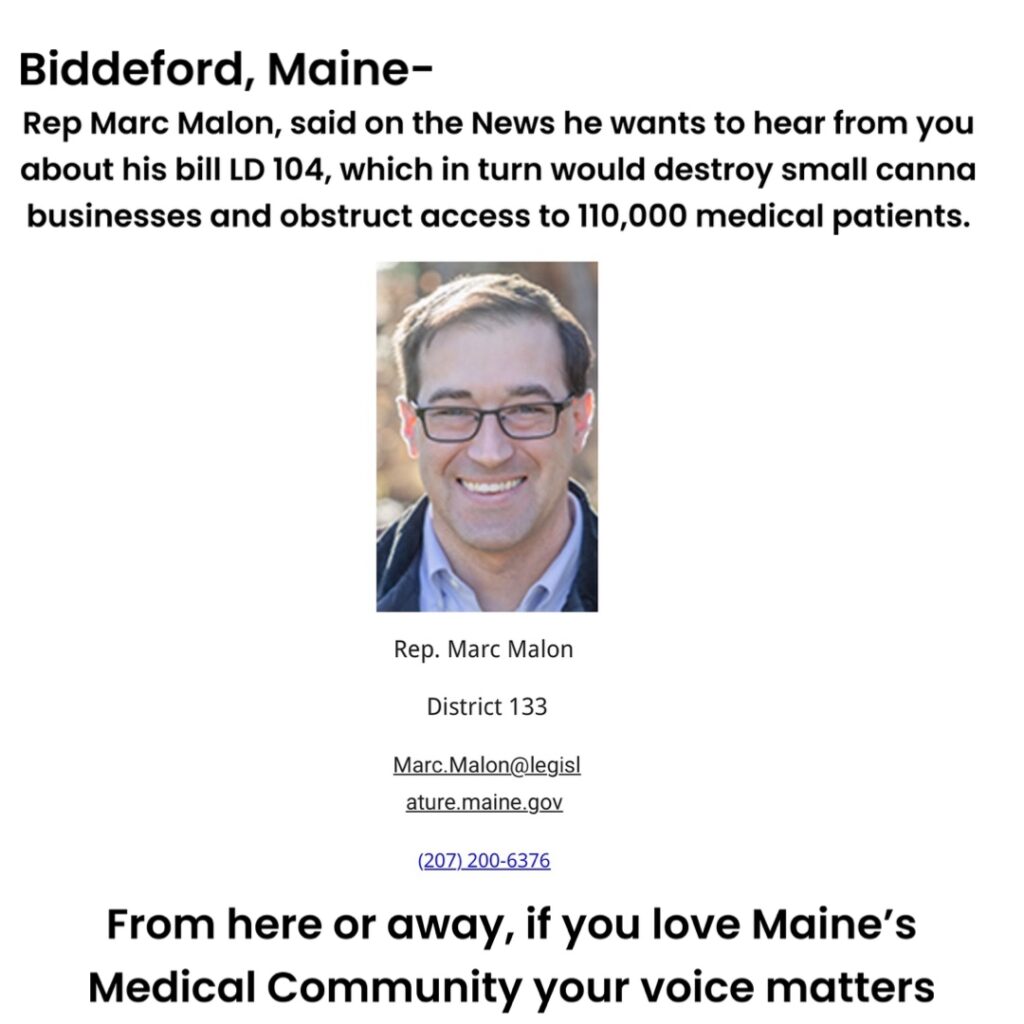Maine’s latest cannabis legislation, An Act to Protect the Health of Medical Cannabis Patients and Streamline the Mandatory Testing of Cannabis (LD 104), might look good on paper, but let me be blunt—this bill is a disaster waiting to happen. And if you’re a small business owner or a medical cannabis patient, you need to wake up and realize what’s about to hit the fan.
This bill introduces mandatory testing for every single cannabis product—flower, trim, concentrate, you name it. That’s right, every batch. It sounds like a great way to keep patients safe, right? Wrong. What it really means is that small operators—who are already scraping by in a tough market—are going to get absolutely crushed under the weight of expensive testing fees. If you’re a small grower or processor, you’re looking at tens of thousands of dollars in testing costs yearly, with no guarantee that you’ll even pass. Not to mention, it will drive up prices for patients who can least afford it.
But let’s talk about the testing infrastructure—because that’s where LD 104 really falls apart. There simply aren’t enough testing labs in Maine to handle the demand, and those that do exist are operating with wildly inconsistent standards. These labs don’t even have uniform Standard Operating Procedures (SOPs), and in some cases, they’re not using the same equipment, which means they aren’t even testing cannabis in a standardized way. What that translates to is a patchwork of testing that varies depending on the lab you use. One batch might pass at one lab but fail at another. And sets up possible “pay to play” style schemes, (ex: thc percentage inflation).

This lack of consistency means small businesses could be forced to send their products to multiple labs just to get reliable results, piling up costs and delays. In the worst case, they may even be subjected to conflicting results, leaving them in limbo on what products they can sell—and how much they will cost when it’s all said and done. How can we trust a testing process that doesn’t even have uniform standards across the board? This isn’t just a headache for small businesses—it’s a nightmare for patients who depend on consistency and safety.
And that’s just the tip of the iceberg. The bill also forces businesses to “remediate” batches that fail testing. But here’s the reality: most small operators don’t have the facilities or equipment to properly remediate a batch, especially when they’re already struggling to stay afloat. Fail a test,
and your whole crop could be wiped out. Even worse, if you don’t have the resources to reprocess or discard your entire batch, your business is left holding the bag—and those losses will be passed down to patients in the form of higher prices.
But it gets even worse. On top of that, this LD 104 piles on more red tape and compliance hurdles for businesses that are already drowning in regulation. Small operators don’t have the legal teams or infrastructure to navigate this mess. They will face endless paperwork, fines, and penalties if they slip up even once. And if you think that won’t have a direct impact on patients, think again. Less product means fewer choices for patients, which means less access to the medicine they need. All because some bureaucrats want to make sure every flower bud is “safe” by forcing small businesses to jump through hoops they can’t afford to clear.
The worst part? All of this comes at the expense of patients. More testing means delays, and delays mean patients will go without their medicine or, worse, face rising prices because small businesses can’t afford to operate under this heavy hand of regulation. Patients who rely on cannabis for pain management, PTSD, neurological disorders, or other critical medical needs will be the ones to suffer.
But here’s the kicker: Why should anyone trust the Maine Office of Cannabis Policy (OCP) to get this bill right when they can’t even meet their basic legal obligations? Every year, the OCP is required to submit an annual report to the Legislature, but they’ve consistently failed to meet deadlines, giving the people of Maine reason to question their competency. If the OCP can’t even manage a simple, routine report on time, why in the hell should we trust them with a bill that could fundamentally reshape the entire cannabis industry in this state? We’re talking about a bill that impacts patient access, small businesses, and the future of cannabis regulation—and they can’t even handle the basics.
Maine’s cannabis market doesn’t need more rules that punish the people who have been holding it up from the start. We need less regulation, not more. We need to help small businesses survive, not drown them in testing fees and compliance nightmares. And above all, we need to ensure that patients have consistent, affordable access to the medicine they need. Frankly, we dont “need” a medical program like our adult use program, the adult use program should have created more of a program like the medical program if the state actually wanted the program to succeed.
LD 104 needs to be killed, and it needs to be killed NOW. There’s no room for compromise here. It’s time for the people who claim to support Maine’s cannabis industry to step up and say enough is enough. Don’t let this bill pass. It’s a death sentence for small businesses, and it will put cannabis access in Maine in a chokehold.
If the OCP can’t even meet basic reporting requirements, why should we trust them to regulate cannabis properly? This bill will only make it worse. Fight back. Tell your lawmakers to kill LD 104. This is your chance to protect the future of Maine’s cannabis industry—and the patients who depend on it.
This is an opinion piece and does not necessarily reflect the views of Beard Bros Pharms.
More work from Derek here at Beard Bros Pharms:
A Look Inside Maine’s Medical and Adult Use Cannabis Markets.
When Was Maine’s First Cannabis Recall?
RECAP: Maine Cannabis Summit Recap Hosted by State Rep. David Boyer
Keeping Secrets and Changing Laws: Maine OCP’s Masterclass in Political Sleight of Hand
29 Cannabis Bills Hit Maine Legislature—What’s at Stake for Small Farmers and Patients?
Gov. Janet Mills Just Slammed Maine’s Medical Cannabis Program—And It’s a Total Disgrace

Derek Shirley was born and raised in Pittsburgh, Pennsylvania. At the age of 19, he received a felony for 4 ounces of cannabis. After, he became a “cannabis nomad” living in Ohio, Arizona, and Maine, which he now calls home, and lives with his wife Sequoia and son Haze.
Being a cannabis nomad had its advantages, like relying on all markets for his medical cannabis needs which gives him a unique perspective of the cannabis markets. Currently, he is an influential pro-cannabis activist in the state of Maine who helps local people and small businesses navigate their local and state governments without picking a political party specializing in protecting and preserving the small medical cannabis farmers of Maine. For fun, Derek enjoys screen printing and making cannabis memes under the pseudonym @gettinghighwithcats on IG


















